Rent Renewal
The advance word on Rent (Columbia, 11.23) for the last few months has been that it’s going to feel slightly dated (being a late ’80s piece about some young AIDS-af- flicted Manhattanites), and Chris Columbus, not the grittiest and most naturalistic of directors, will gloss it up too much, so watch out.
The buzz was wrong. Say it again: the buzz was wrong.
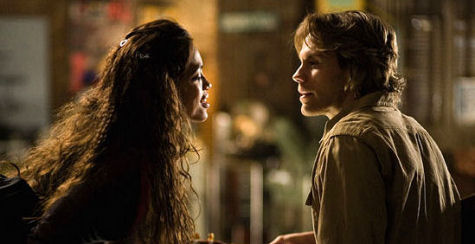
Rosario Dawson, Adam Pascal during “Light My Candle” number in Chris Columbus’s film of Jonathan Larson’s Rent (Columbia, 11.23)
Call me emotionally impressionable, call me unsophisticated, call me a sap…but I saw Rent last night in Santa Monica, and in its vibrant, open-hearted, selling-the- hell-out-of-each-and-every-song-and-dance-number way, it’s a knockout and an ass-whooper and damn near glorious at times.
I didn’t just like it…I felt dazzled, amped, alpha-vibed. I got into each and every song, every character and conflict…I settled back and went with it. People were applauding after almost every song, and the film really does give you a “whoa… this is special” feeling.
Somewhere up there (out there, in there…whatever), Jonathan Larson, the guy who created the play but died in January 1996, just before the stage show opened, is breathing easy.
< ?php include ('/home/hollyw9/public_html/wired'); ?>
Columbus went with almost the entire original cast, and they’re all spot-on. A cer- tain theatricality is inevitable when actors are breaking into song, but everyone plays it down and naturalistic; they don’t project in a playing-to-the-balcony way that throws you out of the piece.
Adam Pascal’s Roger and Anthony Rapp’s Mark are note-perfect. Rosario Daw- son’s singing is surprisingly assured and satisfying, in addition to her usual first- rate emoting. Wilson Jermaine Heredia, Jesse L. Martin, Idina Menzel, Tracie Thoms, Taye Diggs…everyone gets a gold star.
Rent is a slicker, punchier, more revved-up movie musical than Milos Forman’s Hair, which had some of the same elements (kids in New York, in and out of love, looming tragedy). But it’s not that different from the Forman film; it has a similar elan.

I kept saying to myself last night, “What’s wrong with this film?….where’s the mis- calculation? Where’s the gross Chris Columbus saccharine overkill?”…and it just didn’t happen to any bothersome degree.
It may not be hip enough for some of my nyah-nyah, know-it-all critic friends. It may not be Alphabet City enough. It may be, for them, too far removed from the vitality of the original off-Broadway, pre-Broadway show…too much of a Holly- wood-style take on something that may have been a bit sweet or cloying, but which worked because of the Lower East Side funkitude balance-out factor.
Critics said the same thing about Robert Wise’s West Side Story. That overly Oscar-awarded film brought an overly sanitized, sound-stagey quality to the material, wich furthered the loss of the immediacy and excitement of the original B’way play. The dissers of Wise’s film were right. It was too 1961 mainstream.
But Columbus is not Robert Wise. He lived in Manhattan way back when and knew the Lower East Side, he knows the stage show backwards and forwards, he’s pruned it down a bit and has made a film that’s a lot tighter and brighter and a cleaner “sell.”
I saw Rent in ’96 with Jett, who was then about eight, and I remember enjoying the energy and a lot of the songs and feeling a general respect for it…but I wasn’t floored. For me, the film is a better ride.
I don’t want to compare apples and oranges, and I understand that Rent-heads might not agree that it’s “better,” but the film is a cleaner, more easily processed thing, and it delivers a fuller, riper feeling.
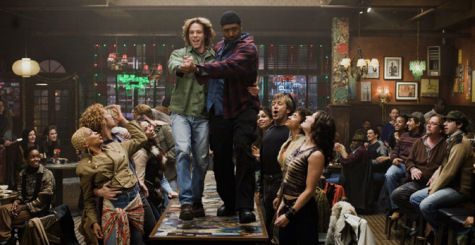
The “La Boheme” number
There’s really a lot to be said for being able to hear each and every song lyric. (I digested them only occasionally when I saw the stage version.) And being able to hear each and every voice in the chorus of “Seasons of Love” (and every song after that) provides an amazing high.
Has Columbus made a kicky and colorful c’mon-kids-let’s-put-on-a-show musical? Yeah, kind of…but what’s wrong with that? And what other way could Columbus have gone? Play down the energy, go grimmer, shoot in on Super 16mm, channel Darren Aronofsky or Larry Clark?
Rent is a big-studio movie musical. As I understand it, the idea is to turn people on, attract the fans of the stage show, sell tickets, etc.
It’s not Open City or Paisan or Rocco and his Brothers. It’s a revamp of Puccini’s “La Boheme” with all those primary emotions, catchy thrash-guitar songs, drama- tic condensings, lovers loving and losing each other, tomorrow belongs to no one so go for it today, etc.
And it’s Rent, after all…butter wouldn’t melt in its mouth.
I’m sorry to differ with the nyah-nyahs, but Columbus has taken these ingredients and made it all sound quadruple-fantastic (be absolutely certain you see Rent in a theatre with a great sound system) and punched it up and brought out the bells and whistles and made a movie musical that really delivers.
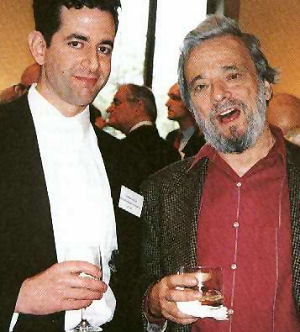
Rent creator Jonathan Larson, composer-lyricist Stephen Sondheim sometime around ’94 or ’95.
You’ll be more likely to feel this way if you’re a not-very-hip type like myself, or if you’re in the same kind of head-space as those 425 satisfied folks who saw it with me at the Aero theatre. And if you’re in the opposite camp…it’s your call.
Rent is set in 1989 — the stage show was written between 1988 and ’90. The show is basically about the effect that being close to death has upon your basic life atti- tudes. We all know the riff about “the clarity of mind experienced by a man stand- ing on the gallows is wonderful,” etc. That’s all that’s being said here, and that’s obviously a theme that will never lose relevance.
The young-gay-guys-and-urban-drug-users-dropping-like-flies-from-AIDS element isn’t the same today as it was in the early days of the first Bush administration , obviously (and thank fortune)…but this doesn’t date the film — it just places it in a certain cultural context, and that’s nothing to get over.
I know it when something is working. Call it subjective, but I felt it last night and it wasn’t just me.
A guy who loved the off-Broadway stage version said he’s heard it doesn’t work because the actors seem too old. “They’re all supposed to be in their early 20s …the actors all look like they’re 28 or 30,” he told me this morning. That’s bull- shit…they’re young-enough looking. It’s a non-issue.
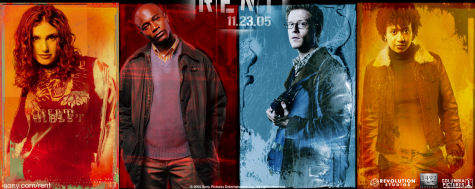
There are three love relationships in Rent, and only one of them (Adam and Rosa- rio’s) is hetero. We’re really in a gay-friendly season these days, and there’s no watching Rent and missing the notion that we’re all God’s children. The Mel Gibson contingent can go stuff it.
The energy and punch of this show are there all the way through, and the emotion- al specifics of each and every character and situation are clearer and more vivid than they appeared to me when I saw the stage show…whoops, repeating myself.
There will be more to say about Rent in a week or two. Those crab-heads really need to be slapped around.
Columbus did a post-screening q & a with Variety‘s Ian Mohr, and here’s how it sounded. It’s a big fat (probably slow-loading) sound file, but it’s worth a listen.
You’ll hear me ask a couple of questions — one about an angry duet number between Pascal and Rapp that was cut, and another about the “dated” issue, which Columbus answers pretty well.
Silverman Live
I hate the way I sometimes tend to digress during inteviews (i.e., talking about myself rather than the subject). I feel like I’m being fairly precise and down to it when the interview is happening, but I always think otherwise when I listen to the recording because I sound like like a self-obsessed putz.

Times photo of Sarah Silverman, taken at a party last Monday night in Manhattan for her film Jesus Is Magic
That said, if you’re not too sound-filed out by the recording of the Chris Columbus q & a, here’s a recording of my time spent with Sarah Silverman in Boston last Friday afternoon.
The latest Silverman interview, written by New York Times correspondent Marcelle Clements, which went up today, is another good profile, aspiring to the level of the 10.26 New Yorker piece but shorter.
Modern Marketing
You’ll experience a fairly strong disconnect if you (a) read Peter Biskind’s interview with Woody Allen in the December Vanity Fair, and then (b) examine DreamWorks’ newspaper ad in last Sunday’s New York Times on behalf of Allen’s Match Point (opening 12.25, limited).
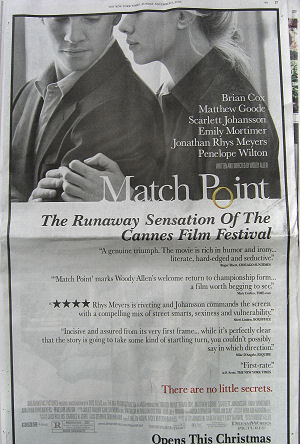
It’s not like you need a magnifying glass to see Allen’s name, which is right under Penelope Wilton’s, but you do have to kind of lean in and squint. The typeface is obviously less vivid than the one used for the actors’ names.
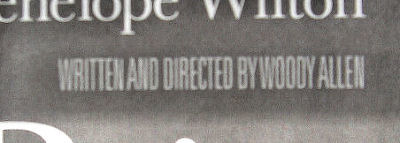
I can imagine the marketing execs’ memo to the art guys: “Okay, his name has to be in the credits above the title but let’s do what we can to obscure this. Okay? No casual reader of the ad is supposed to see his name. Just so we’re clear on that.”
The reason is that the name “Woody Allen” is a big negative with the under-30s. I don’t want to give this attitude any more respect or attention than I have to, but that’s the equation…”Woody Allen = stay away.”
Match Point may have an effect upon this attitude, but you can’t predict. I just know that under-30 movie tastes are really fascinating at times.
Girl Can’t Help It
There’s no question about Sarah Silverman being some kind of avatar of a new, out-there comic dispensation. She’s had a handle on it for a while…ten years or so, she told me last Friday…but most of us, I’m presuming, are just starting to tune in.
There’s something about that dry, super-perverse delivery of hers…the dingle-dan- gle rhythm of her schpiel…it’s just perfect. I could listen to that reedy chatty voice for hours. And those oh-and-by-the-way-I-was-licking-jelly-off-my-boyfriend’s-penis jokes…not sexy but so sublime.
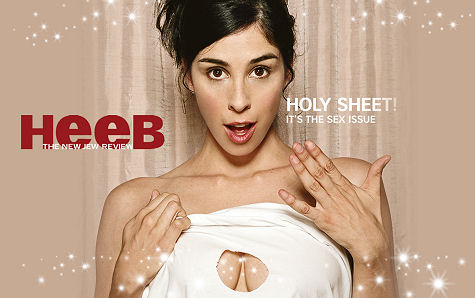
Comic Sarah Silverman
I go to a comedy club maybe once every couple of years so I obviously don’t have the perspective, but Silverman seems possessed by and onto something extra.
There’s something Lenny Bruce-ian about her. She’s not really jazzy or free assoc- iative and she doesn’t do political humor (not my by my definition of it), but there’s an element of provocation, a kind of maybe-you’re-getting-this-and-maybe-you’re- not-but-maybe-you-should.
It’s all pretty much there in Silverman’s Jesus is Magic (Roadside Attractions, 11.11), a kind of get-acquainted performance film that includes a sassy little musical intro and an occasional staged, out-of-the-theatre short.
Don’t take this the wrong way, but I didn’t laugh that much during Jesus is Magic. Silverman is obviously funny-nervy, but I was too into watching her perform. And for some of us, mind-game humor is more heh-heh than hah-hah.
An online commentator wrote, “Instead of laughing at the content [of her jokes], you laugh at the attitudes she portrays and worry if you should find them funny. You either miss the irony of her comedy or you have to appreciate her genius as an actor, writer, comic, and social critic.”
The heart of Jesus is Magic (a dig at Christian mythology… what will the Mel Gib- son wackos say?) is Sarah doing her sly and very dry little-girl-telling-an-outrage- ously-provocative-joke routine.

Sitting in a dull corporate boardroom on the 16th floor or Boston’s Seaport Hotel — Friday, 11.4.05, 12:35 pm.
There are two sides to her stage manner — Silverman seemingly amused by the discomfort created by her choke-on-it riffs (i.e., a marketing proposal that would exploit the fact that American Airlines was the first to slam into the World Trade Center) and oblivious to her words in a very bright, manipulative-Jewish-girl-who- knows-how-to-push-her-father’s-buttons way.
Listen to these clips. Click on “Nanna.” Consider the way Silverman says. “I’m sorry… alleged Holocaust.” She almost mutters it, like she’s talking under her breath. Which is why it’s funny (to me). If she’d turned up the delivery just a bit, or pushed it in some other direction…
Listen to “St. Christopher Medal” and the kind of dreamy way she says, “I wear this St. Christopher medal sometimes because — I’m Jewish, but my boyfriend is Catholic — it was cute the way he gave it to me. He said if it doesn’t burn through my skin it will protect me.”
Silverman isn’t vulgar or “blue” or gripped by some fiendish rage. She’s sweet, friendly, prim, well-behaved. No element of madness… obviously disciplined…hip and shrewd, but concerned with basic Jewish-girl issues (love, family, being thin) deep down.
Of course, doing interviews with journalists involves a kind of performance.
An excellent profile of Silverman ran in The New Yorker a couple of weeks ago. Written by a poet named Dana Goodyear, it’s called “Quiet Depravity: The Dem- ure Outrages of a Standup Comic”.
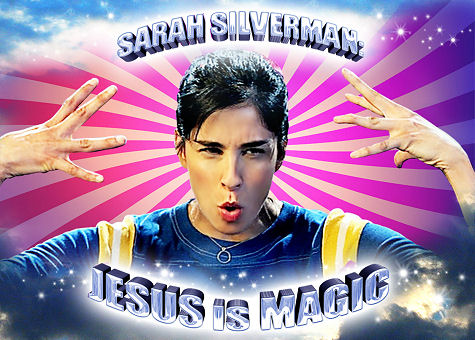
“Silverman is thirty-four and coltish,” she writes early on, “with shiny black hair and a china-doll complexion. Her arms are long and her center of gravity is low: she is five feet seven, and moves like a vervet monkey.”
As lame as this sounds, Silverman’s black hair is mesmerizing. I was thinking all through the film how it’s a world unto itself…as black and freshly-shampooed-per- fect as Snow White’s.
“Onstage, she is beguilingly calm,” Goodyear observes. “She speaks clearly and decorously. The persona she has crafted is strangely Pollyanna-ish and utterly absorbed in her own point of view. She presents herself as approachable though deranged, a sort of twisted Gracie Allen, and she never breaks character.
“[Silverman] talks about herself so ingenuously that you can’t tell if she is the most vulnerable woman in the world or the most psychotically well defended. She cross- es boundaries that it would not occur to most people even to have. The more inno- cent and oblivious her delivery, the more outrageous her commentary becomes.”
Hence my interest, fascination, attraction…
A smart guy wrote me after reading in the column that I spoke to her last Friday, and asked about her in-person allure. I replied that “she’s really sweet and earnest in a girly, sitting-around-in-her-sweatpants way…like a lot of smart Jewish girls I’ve known. Endearing, straight-from-the-shoulder, confessional.
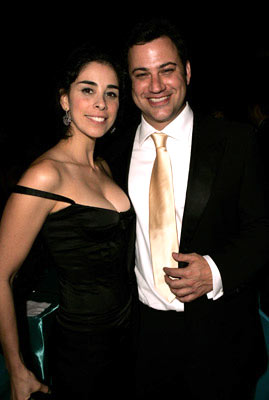
Silverman, boyfriend-comedian Jimmy Kimmel
“Okay, she seemed a tad hotter in the concert film than in person, but workout clothes have a way of toning things down. Plus she’s very fair-skinned and freck- ly…but also impish-pretty with lots of sparkle. I liked her right away.
“I loved that she’s not nuts (most comedians seem to live in dark, despairing pla- ces) and that she’s totally into discussing other actors or comedians or movies and doesn’t try to steer things back in her direction, like many actors and actresses do during interviews.”
I asked Silverman at what point did she realize she’d finally refined and gotten hold of her unique comedic voice and attitude. “Sometime around 24, 25,” she replied. Which meant around ’94 or ’95.
At one point she sat side-saddle on the half-sofa, tucking her feet off to the side, up against the arm rest…the exact same position she was sitting in during her reasonably funny Aristocrats interview.
Her boyfriend is comedian Jimmy Kimmel, the amiable, barrel-chested late-night ABC talk-show guy. I told Silverman I like his humor but I can’t stand the elephant- collar shirts he wears. It’s an under-40 GenX guy thing…the influence of the mythic Italian shirt designers of the ’80s never got through. The loyal Silverman told me she had no idea what I was on about when I tried to explain.

Silverman’s next performance is in Rent (Columbia). A guy she ran into recently told her she’s the funniest thing in the film. (Is that a distinction worth noting? It’s a film about kids dealing with AIDS in Manhattan’s Lower East Side in the early ’90s.)
Silverman has a meatier part is Todd Phillips’ School for Scoundrels, a comedy that will costar Billy Bob Thornton, Jon Heder and Michael Clarke Duncan.
I mentioned to Silverman that there’s a 1959 British comedy with the same name. She said she didn’t think so and suugested I might be thinking of School for Scandal. I didn’t push it, but Scoundrels did come out in ’59, and costarred Terry Thomas and Alastair Sim.
I really think it’s important to see Jesus is Magic and know who Silverman is and what she’s on about. She’s an echo chamber of sorts…tethered to certain aspects of our general cultural malaise in the same way that currents running beneath the culture of the mid ’50s are discernible when you look at blurry kinescopes of Sid Ceasar and Imogene Coca.
Tempest Approaching?
“If you’re looking for an angle on The Chronicles of Narnia: The Lion, the Witch and the Wardrobe, you might enjoy this one:
“The promotion and release of the film is going to bring about a red-blue religious wackos vs. the rest of us dust-up. It has the potential to be a moderately big deal, and thus far almost no one in the entertainment press is covering it.
“The series of fairy tales this Narniais based on are generally seen as an old-fashioned Christian parable, i.e., the New Testament rewritten with talking animals and magic standing in for disciples and theology, plus a big talking lion standing in for Jesus.
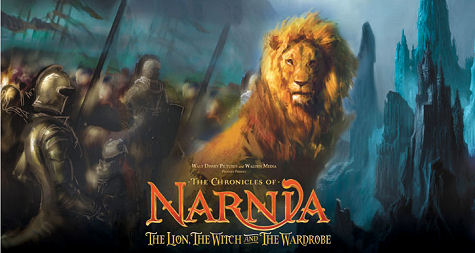
“The problem is that these days, it’s viewed — incorrectly, I might add — as a kid- targeted endorsement of Passion-style fundamentalism by a lot of the fringe- wacko hardliners, which is a shame and a joke as the theology expressed by the story is exactly the sort of kinder, gentler, more intellectual-and-philosophical brand of Christian thought that the Passion posse so despises.
“These fringe-wacko hardliners are already raring, ready and organized to try and piggyback their agenda onto this film, and Disney has gone so far as to hire special faith-oriented marketing firms to help them assuage concerns that they might ‘secularize’ the material.
“Plus some of the more faith-oriented fans are gearing up to mount what would have to be called a boxoffice holy war between this flick and the Harry Potter franchise, which they view as Narnia‘s pagan upstart enemy.
“Here’s the best part: The fan base will also be at war within itself, as there are basically two camps of heavy-duty Narnia devotees…an even split between those who appreciate it simply as a series of beloved children’s literature and those who want it viewed only as a kind of 700 Club recruiting pamphlet.

“The blood between these two camps is so bad it makes the Original Series/Next Gen split in Star Trek fandom look like a mild family quarrel, and if the Narnia movie makes any kind of notable mainstream splash in theaters it’s gonna be open war right out in the cultural square.
“Mark my words, this is going to be an interesting release no matter how good the flick turns out.” — MSTMario2@aol.com
Wells to Mario: I have to hunker down and do some studying about this. I don’t know anything…zilch.
Grabs

Boston statehouse — Friday, 11.4.05, 8:25 pm.

Sign in front of 2038 pairs of boots arranged in military formation on the Boston Common — Friday, 11.04, 8;40 pm.

Sign placed opposite the Boston Common display of U.S. military boots.

Waiting for the Red Line subway on way back from Long Beach airport — Sunday, 11.6.05, 9:40 pm.
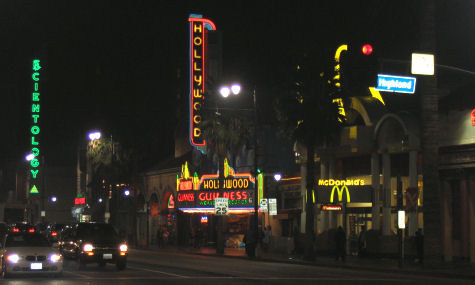
Hollywood Boulevard near corner of Highland — Sunday, 11.6.05, 9:55 pm.

Mannequin inside Boston’s Prudential Center/Copley Square mall — Saturday, 11.5.05, 7:05 pm.
Jarhead Muddle
“I went to dinner and a movie with some friends Saturday night. The local theater didn’t have Capote so we were stuck with a choice between Shopgirl and Jarhead, and we decided on the latter.
“My expectations were low enough that I wasn’t disappointed when it was over; I was more disappointed going in then coming out. But two things struck me upon exiting the theatre.
“First, there are too many kids who treat the experience of watching a war film like it’s “so soooo coool” and “awesome” and exchanging quotes from Full Metal Jacket. Perhaps they would like to experience the ‘pink mist’ as well. At a risk of getting all Howard Beale on you, we are in a war now and kids are getting blown up almost everyday, there’s nothing cool about it, right? We’re in a war now. The audience seemed detached from this.

Jarhead costars Jake Gyllenhaal, Peter Sarsgaard
“Secondly, Jarhead seemed to play mostly as a deadpan postmodern black comedy. I laughed more than anyting else. Another measure was that during pivotal scenes there was a smacking irony, a harsh truth that you would have to either laugh through or become the Troy character.
“When Swoff and Troy are robbed of their kill at the end, it felt to me like dark comedy. The sexual angst was mostly played for yuks even though underneath the ramifications are ugly. Lines like “shooting my gun in celebration being the only time I fired it the entire war” or “that’s Vietnam music, we don’t even get our own music” are what stick in my mind, and they taste of dark humor.
“But I can’t tell if this was the intention of Sam Mendes. Was he boldly and delicately making a black comedy and not telling the execs, or is he just tone deaf? Am I the only one or did you notice this too?” — George Bolanis , Pittsburgh, PA.
Girth
“I dunno…somehow ‘The Fat Clooney’ sounds like the sequel to The Big Lebowski — Mike Mayo
Wells to Mayo: Exactly. Immediate coolness. My want-to-see on Syriana shot up ten-fold after hearing it.
Lifeboat
“Liked that WIRED bit about Hitchcock’s Lifeboat, a film I’ve loved for years. Hitch often gets dismissed as a serious filmmaker because his movies are fun to watch and were, in many cases, clearly commercial.
“It’s become fashionable for guys like Tarantino to bash on Psycho), but Hitchcock had an artistry to his filmmaking and a depth of understanding of the human condition that many of today’s so-called auteurs lack, in my opinion.
“I just saw Rebecca for the first time and was blown away. Even if Selznick did come along and put his own music in, etc., it’s still a visionary work by a filmmaker at the top of his game.” — Michael Goedecke
Choices
“I was reading your most recent comments on why some films that give off what I’d guess you’d call an emotionally burnished quality don’t seem to connect with the audiences in the way that some of us might expect. There’s no single thing that explains this, but I can think of a few.
“First is the inevitable focus on box office, which is one of the few, hard indicators of the ‘success’ of a film, but given the changing nature of entertainment options and methods of consumption, I don’t believe it’s the only, or in some cases, even the primary factor.
“There are many films that I’d like to see in the theater, but if I miss that two- or three-week window when they’re in wide release — either because I was busy or just not in the right frame of mind — than I’ll opt to buy the DVD. I’ve got a decent home theater set-up, and frankly I don’t think my experience watching, say, Hustle & Flow at home is going to be qualitatively different than seeing it in the theater.
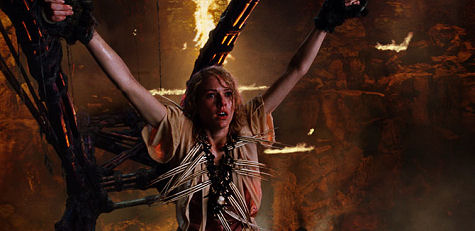
Naomi Wattts in King Kong
“I also think you make an unfair distinction between those who might go to see Saw II and those who might prefer to see The Constant Gardener. At least among my particular group of friends, those are overlapping audiences, and going to catch one movie on opening weekend means we’re unlikely to see the other.
“It’s not a sign of lack of interest, but a matter of mood and social dynamics. And frankly, DVDs provide a safety net because there will always be a DVD, and then I can choose where, how, and with whom I want to watch the movie on my own timetable.
“Lastly, whenever anyone points to the disappointing response to Cinderella Man I just have to shake my heard. I can’t pretend to know what was in the hearts and minds of everyone who chose not to see the film, but I know that for me it was contempt borne of familiarity.
“I mean, I’ve seen this story. So. Many. Times. I know every single emotional beat that will be hit, every single turn of the plot screw, the entire shape of the dramatic arc.

Ralph Fiennes in The Constant Gardener
“And it’s simply not interesting, no matter who wrote, directed, or acted in it, unless they can give me something new, deeper, surprising. And the trailer did a great job of telling me that there was absolutely nothing like that in the film. It’s Oscar Model #21A, and frankly it just bores me, and seems to bore most other people I know.
“I also agree with the disinterest in King Kong, mainly because I’m uninterested in the original and all succeeding versions. It’s a personal thing, but I really hate the ‘misunderstood hero as antagonist.’ I’ll still probably go see it with a crowd, but not out of any passion for the material.” — Chris Todd
Widescreen Idiocy
“I saw that photo you ran of the widescreen TV with the extra-wide widescreen image of Batman Begins, and perhaps you’re the idiot here. A 2.35:1 film will still have black bars on a 16:9 TV. 16:9 is 1.78:1, and not 2.35:1.” — Grady Stiles
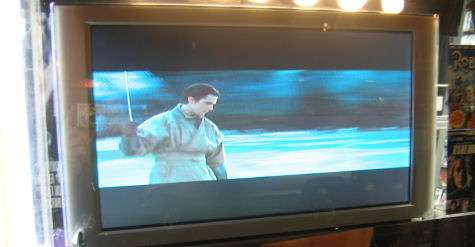
Wells to Stiles: I know exactly what I’m talking about. Black bars are fine…the point is that the anamorphic 2.35 image in that photo has been squeezed down to what looks like a 3 to 1 or 3.5 to 1 image. It’s a widescreen image for morons who don’t know aspect ratios from their anus. I know aspect ratios dead to rights….go to American Widescreen Museum (http://www.widescreenmuseum.com/) and poke around and learn a thing or two. It’s all there. A very smart and knowledgable site.












